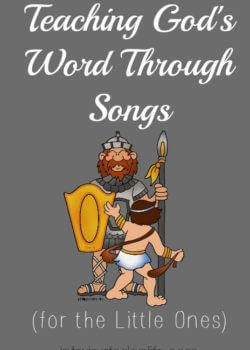With Christmas coming up, there are a few things I want my kids to know about Santa Claus.
I know several Christian parents that actively avoid all mention of Santa Claus. They steer clear of Santa’s workshop at the mall. They don’t have any Santa-looking ornaments on their trees. They avoid any Christmas tunes that mention Santa’s name.

5 Things I Want My Kids To Know About Santa Claus
For some, it is one way to fight the materialism of the holidays (a commendable goal). For others, it is a fight against the pagan origins of the Christmas season. (The Germanic god Odin is one of the inspirations behind the bearded figure we know as Santa Claus.)
For our family, we believe is it important, when possible, to redeem cultural icons and use them for the glory of God. With that in mind, these are five things we want our kids to understand about that ripe, jolly, Santa Claus.
1. Saint Nicholas was a real man with a real love for Christ.
I don’t want my children growing up with the illusion that the white-beared-red-suited-reindeer-flying Santa is real. It’s one thing to tell kids a fiction story both you and they know is fiction. It’s another thing to lie to your children by yanking that fictional character into the real world.
Each year we loved to talk about the real St. Nicholas, a man who was born into a Christian family amidst the great persecutions of the Roman Empire. Losing both his parents at a young age, Nicholas used his inheritance to give charitably to the poor. He later became the bishop of Myra and was present at the first Council of Nicaea where he defended the deity of Christ.
One of our favorite books to do this is The Story of St. Nicholas: More Than Reindeer and a Red Suit.
2. Christmas will come with or without Santa.
It is a popular theme of Santa movies to “save Christmas” by rescuing Santa or giving him aid for his long journey. While some of the save-Santa movies can be fun, we don’t want to give our kids the impression that the fate of Christmas rests on Santa’s arrival.
If we catch a whiff of this Santa-is-the-guardian-of-Christmas in movies or books, we take time to remind our children of what Christmas is really all about.
3. The American Santa is just one of many Santa fables.
Santa has gone through many evolutions: Sinterklaas of the Netherlands, Tomte of Scandinavia, Father Christmas of England, Pere Noel of France, Ded Moroz of Eastern Europe. Each character has their own peculiarities and each one make for an interesting conversation for kids.
If nothing else, by talking about the many Santas of the world, it helps kids get out of their own culture and see their Santa for what he is: a product of our modern American culture.
4. The Santa story is more about anonymous giving, not greedy getting.
The old stories about St. Nicholas tell of his anonymous giving to those in need. The best Santa traditions maintain this important thread: the magic of Santa is not in what he looks like or in who drives his sleigh, but that he can give without being seen. The message should be that anyone can be Santa: we should all strive to give without being seen, just as Jesus commanded (Matthew 6:1-4).
Martin Luther saw the importance of this during the Reformation in Germany. He knew St. Nicholas had the spotlight during the winter holidays, so he created Christkindl (meaning “Christ child”), a cherub-like child intended to represent the infant Christ who brings presents on Christmas Eve. Unlike other Santa figures, this child is never actually seen by children: he’s the gift-bringer you always just missed. He emulates the true spirit of anonymous giving.
5. Santa is like the clown at Jesus’ birthday party.
With each child we’ve told the same story about St. Nicholas. We help them appreciate the historical person. We also help them understand what significance Santa has in our home: “He was a good Christian man who lived long ago. He’s gone to heaven, but people still like to dress up and pretend to be St. Nick today. He’s like the clown at Jesus’ birthday party. He helps to make the holiday memorable and fun, but he’s not the focus of the party. Jesus is.”
Final Thoughts About My Kids and Santa Claus
There are some good and positive Christian things that my kids can learn from Santa Claus. With family discussions and careful screening of Christmas movies, songs, and other cultural Christmas things, we can have a stronger reminder of the importance of Christ’s birth while still enjoying the holiday spirit.
What do you tell your kids about Santa Claus? Tell me in the comments below!










I agree wholeheartedly with each of your points! My children are only 3 and 4, but they know that Santa is a name for St Nicholas, who was a real person who did many good works for the poor in the name of Jesus. They also know that the modern Santa is just a costume in his memory, but that people like to pretend he’s still alive and giving gifts, and maNY parents let their children believe it’s true. The most important thing I want them to know, is that Santa only gives presents if you are good, but that Jesus, whose birth we are celebrating (even though it’s not the right time of year) gives a gift that is for everyone no matter how good you try to be, or how bad you know you are. His gift is for all, but if you think you are good enough to deserve it, you are mistaken. The truth is, people who think they are good enough are usually the ones who will probably never receive it, not because it’s not offered to them, but because they think they don’t need it. We’re all on the naughty list. But Jesus’ gift is to put us, not on the nice list, but in the Lamb’s Book of Life, which is far better than anything Santa will give them (which in our house is nothing…we tell the truth about where gifts come from! From each other! Because we love each other, no matter how well-behaved you are or are not!). We also make sure we spend time giving gifts to Jesus…after all, it is His birthday we’re celebrating! And they only get three gifts from Mum and Dad…something to read, something to wear, and something to do. After all, three gifts were enough for Jesus!
I like that: the Lamb’s Book of Life vs. the Nice List. Very clever. Thanks for sharing!
This is exactly how our family handles it too. I especially love point #2, one I’d never thought of before.
Christmas doesn’t need to be “saved.” We do. That’s why Christ was born: to save us. 🙂
Oh, #5 is a good one! (I mean, they’re all good points, but that’s an especially creative illustration.) We don’t “do” Santa at our house, but it’s never been something that we *work* at avoiding or something, like, “oh, no, if our kids see Santa Claus, they’ll be polluted.” It’s just a tradition we’ve never DONE. My oldest used to call him “the Christmas man,” because she’d see men dressed as Santa in the stores or in commercials, but we’d never really put a name to him. (We have talked about St. Nicholas since then; it just didn’t seem to be a priority with a 3yo who didn’t care.)
I must confess there are Santa songs i REALLY dislike – Santa Claus is Coming to Town comes to mind. I don’t like the idea of attributing to him traits that only God has (“he sees you when you’re sleeping; he knows when you’re awake…”) or “scaring” kids into behaving well. But mostly, songs like this are just FUN rather than SIGNIFICANT, and there’s nothing wrong with fun!
Thank you SO much for this post!!!!
You’re welcome!
If you are interested in knowing where some of the other traditions surrounding Christmas originated watch this video entitled Truth or Tradition….
http://www.youtube.com/watch?v=-RdJvQg7YqI
I’m familiar with that video, yes.
I love the way you describe Santa as the clown at Jesus’ birthday party. That’s a good description for how we already treat Santa — we don’t avoid him, but also don’t present him as a real being who brings presents. It’s fun to include him at times, but he’s not the “guest of honor.” I think your phrasing will help us as we explain things to our kids in the future, and also as we field questions/discussion from other family members who present Santa as real to their own children. Thanks for sharing!
Thanks, Jennifer!
Thank you for this post!
And thank you for the children’s book recommendation. Do you have any other resources for explaining St.Nicholas? That book looks great, but it is crazy expensive in Canada.
My kids are 4.5, 3, 2, and 7 months.
Thanks!
You might try The True Story of Saint Nicholas by Rebecca Benson Haskell. We’ve really enjoyed that one too.
Veggi Tales has a great movie about St. Nicholas..
https://www.youtube.com/watch?v=LMlb5cD-WRQ
Yes. We’ve seen that one. My favorite part is when little Nicholas is going up to the gardening equipment handing on the wall and he sees three hoes. He hops from one to the other going, “Ho. Ho. Ho.” Cracked me up.
Thank you for such a thoughtful post! Such good ideas for our family who has always been on the fence about Santa.. great way of telling our children who “Santa” really was!
Thanks, Rachel!
Thought provoking post. I struggle with the myths for kids in our culture: Tooth Fairy, Easter Bunny, and Santa. They are beloved traditions that add some extra excitement to the loss of a tooth, and surprise gifts from a bunny (?!) and a jolly old soul. But they are also kind of odd…slightly disturbing that a fairy wants teeth, or a bunny gives baskets of chocolate eggs, or a man with a pipe delivers gifts in secret inside your house (yikes!)! I remember when I figured out Santa, putting the clues together. It was like solving a great mystery; I had a sense of satisfaction from it, and a bit of dismay that my parents had perpetuated a myth like that. I did enjoy preserving the mystery of Santa for my younger sister and it was fun to play along to see her excitement.
Your post reminds me to introduce St. Nicholas’ story to my kids, moving the focus away from Santa and more towards Advent. But I would hate it if my kid ruined another kid’s belief in Santa, as everyone has their own beloved family traditions at this time of year. How do you keep your kids from spoiling the story of Santa for a friend? Reminds me of the movie Miracle on 34th Street, when Susan kept telling everyone that Santa was just a nice old man with a beard. Such comments could inadvertently crush another child’s hope in the goodness of a benevolent gift giver who is seen, which could be a foundational step towards believing in the goodness of a benevolent Father in Heaven, who is unseen.
Hi Beth,
Great question. For us, we’ve not run into too many situations where they rub shoulders with other kids who actually believe in Santa—for the most part, their friends come from similar homes where Santa isn’t a fixture. A lot of parents where we live don’t like to teach their kids that Santa is real (on principle) or they have given up on the idea because so many of their kids’ peers know the truth.
That said, I try to maintain a positive sense about Santa in the home. We don’t tend to say things like, “Santa isn’t real.” We say, “Yes, St. Nicolas as a very godly man who lived a long time ago,” or “There are many great traditions around the world that picture Santa in different ways.” I find when my kids are talking about Santa (such as seeing him at the mall), the focus of their conversation is not on, “That guy isn’t real.” The focus is more on the fun of the moment.
I appreciated this post (even though it’s a little late for me to find it!) And I wanted to share about the Christmas tradition I learned about here in Czech Republic- on 5th December it’s Mikulas Day, in memory of St. Nicholas, where children will receive small gifts of sweets from friends and family, and from Mikulas’s good angel helper who appears with Mikulas in public squares etc.- if they have been good through the year! If not, they are introduced to the Devil, another figure who appears on this day. I guess its an encouragement to the children to be well behaved! And Christmas Eve for my husbands family, is the traditional gift giving, when under the guise of ‘Little Jesus’, gifts are shared with the whole family. Everyone receives a gift from ‘Little Jesus’ (Jezisek), and nobody knows who the gift is really from….
Thanks for sharing these traditions!
I read comments on a blog last year that describe some Christian parents treating Santa like they would a superhero character. He is in costume, he’s in the mall, he’s on tv (he can’t be avoided). They tell their kids that other families play a game where parents pretending to be Santa give gifts, and not to spoil the game for the kids who are playing (reminding them how they feel when someone ruins a game). I was raised knowing the truth (along with the truth about the Easter Bunny and the Tooth Fairy) and being told to keep my mouth shut and not ruin it for others. I liked it because I knew the secret, and giggled to myself because the other kids were being fooled. Now as a parent I am conflicted with it ALL. I don’t want to lie to my kids, but I don’t want to spoil the magic and imagination. My oldest is 4, so it is time to make a final decision on which way to go. Today a lady in a store asked my son what he wants Santa to bring him. He didn’t have an answer because we haven’t really talked about it (I’m putting it off until we make a final decision). What should he say in response?
I would explain to your child that when adults ask, “What do you want Santa to bring you?” it’s a way of saying, “What do you want for Christmas?” Tell you kids that adults know Santa is a fictional character, but they also know it is fun to play pretend, so we have people dress up like Santa and decorate malls like Santa’s workshop just for fun. When an adult asks you want you want from Santa, just tell them what you want for Christmas, knowing it is really mommy and daddy and others who give you gifts, not Santa.
Oh, I love this!! So glad I saw the button on the side of your blog for it.